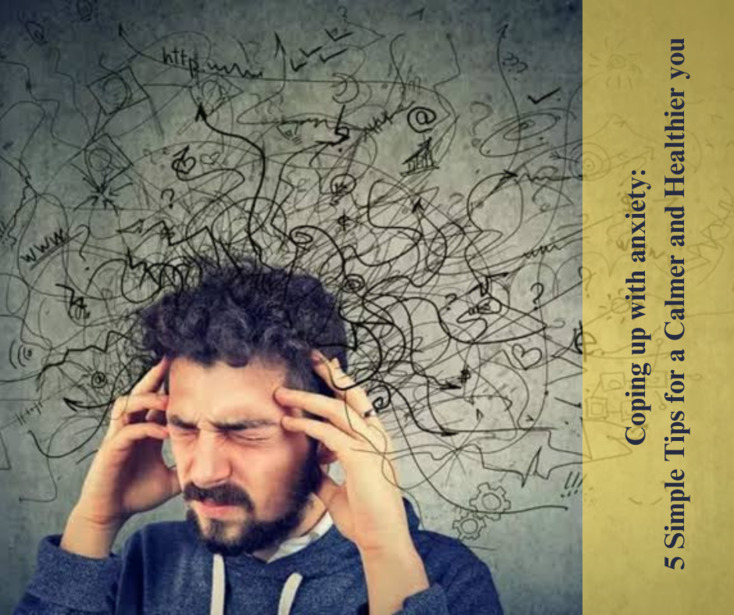Anxiety can knock at your door at any time. Whether you’re a college-going student, a hardworking employee, or a person enjoying your retirement, anxiety doesn’t differentiate, nor does it warn.
In 2019, an estimated 275 million people suffered from anxiety disorders. (Whitby, 2020)
Feeling anxious is normal. It is simply feeling or showing worry, nervousness, or unease about something with an uncertain outcome. Such situations come up every day. We often find ourselves in unpredictable circumstances. In fact, most of the time, things are beyond our control. Therefore, anxiety is legitimate.
When does anxiety become dangerous?
Spells of anxiety that last for a brief period of time, ranging from a minute to a couple of days, are okay. But when it persists longer, we need to ring an alarm for ourselves. When we leave our anxiety unwatched, it grows and deepens, leading to a disorder. It pushes over to cause our body and mind to not be in order anymore and cause unrest. It may also give rise to various phobias, which means an extreme or irrational fear of or aversion to something.
Examine your feelings
A persistent fear of certain places or situations can make you feel trapped, powerless, or embarrassed. These feelings lead to panic attacks. You may even start to feel constant anxiety and worry about ordinary or routine activities. These feelings of worry then begin manifesting as physical problems in your body. You may notice headaches, stomach upset/ailments, or trouble sleeping. A sudden bout of extreme anxiety or terror accompanied by feelings of looming danger, shortness of breath, chest pain, and pounding heartbeat (palpitations) are also signs of the same. Obsessive-compulsive disorder (OCD) is also a common anxiety disorder.
Generally, feelings of anxiety go away as a stressful situation fades out. But if you feel your anxiety is not going away and is worsening over time, you should visit a doctor. Treating anxiety and other mental health conditions is easier before symptoms worsen and the issue deepens.
You should visit your doctor if:
- You feel you’re worrying so much that it’s interfering with your routine life
- Your anxiety, fear, or worry feels stressful and hard for you to control
- You feel depressed, are using alcohol or drugs to cope and becoming dependent on them,
- You have other mental health concerns besides anxiety
- You are living your life feeling that your life has lost all meaning and purpose
- You are experiencing suicidal thoughts or are observing suicidal behavior in yourself (if so, please seek immediate medical assistance at your nearest hospital).
Unfortunately, the modern-day healthcare industry focuses primarily on our physical well-being, rather than taking a more holistic approach.
So, here’s a list of a few things you can do to remain calm, relaxed, and ease your anxiety.
- Distract Yourself.
Often, the most effective method to stop anxious thoughts is to distract yourself and shift focus. Engage in a relaxing and enjoyable activity to clear your mind.
Some of the activities can include –
- Listening to upbeat music
- Reading an engaging book
- Watching a funny movie
- Creative tasks like drawing or painting, etc.
- Head Outdoors
A study by Science Direct found that spending time outdoors can do wonders for your mental health. Time spent outdoors or in a natural setting significantly improves physical, emotional, and mental health. (Coventry et al., 2021)
Simple things like just cycling around the neighborhood, walking in the local park, or doing anything that exposes you to sunlight and fresh air increases blood circulation to the brain and promotes the release of “happy” chemicals like serotonin and endorphins.
Overall, being outdoors and getting sunlight for just 15-20 minutes helps alleviate anxiety and promote mental and physical well-being.
- Exercise often
Recent research published on anxiety and depression have discovered that people who engaged in physical activities very rarely were more prone to develop anxiety symptoms than those who were more physically active. (Kim et al., 2020)
Moving and exercising your body decreases muscle tension, which helps you feel calm and reduces anxiety.
Thus, taking some time to focus on your physical health may help relieve anxiety and stress.
Aim for at least 2½-3 hours of moderate-intensity physical activity each week.
Most importantly, choose an exercise regime that is fun and enjoyable. Instead of just mindlessly lifting weights in the gym, you can opt for kickboxing, gymnastics, or even Zumba! Or simply play your favorite party track and start jumping to the drum beats.
- Meditate
Whenever you feel anxious thoughts creeping up your mind, pause for a moment and try to declutter.
Meditating and implementing various relaxation techniques is the best technique to regain composure and restore mental calm.
Meditation, paired with breathing exercises like the 4-7-8 technique (where you inhale till the count of 4, hold your breath till the count of 7, and exhale till the count of 8), also provides a rejuvenating effect, making you feel more centered, refreshed and energized.
Here is a very basic meditation technique:
- Start by getting into a comfortable seated position.
- Straighten your spine, unclench your jaw, and relax other muscles.
- Close your eyes and inhale slowly through your nose. Follow this inhalation with a deep exhalation.
- With each breath, notice how you feel throughout your body.
- If you feel tension in certain areas, with each exhalation, visualize stress and tension being released from your body.
- Continue with the exercise for as long as you like.
- Adopt a healthier lifestyle
Make healthier changes on and off work to feel mentally and physically better. As we all know – a sound mind resides in a sound body.
A few tips to move towards a healthier lifestyle are –
- Eat well-balanced meals – Follow a proper routine and avoid skipping meals. Prefer fruit, vegetables, lean proteins, and whole grains instead of consuming too many carbs, sugar, or caffeine.
- Get proper sleep – When under stress or anxiety, your body needs additional sleep and rest. Make sure that you’re well-rested and get enough sleep. Most experts recommend that adults sleep at least 7 hours per night.
- Maintain an optimistic attitude – Focus on life’s good, beautiful, and positive aspects. Make an effort to replace negative thoughts with positive and happy ones. Appreciate and be grateful for the small, everyday blessings.
- Stay connected – Surround yourself with quality company and spend time with friends and family. Doing various activities together strengthens your bond and makes you feel safer, secure, and involved.
Escaping the clutches of anxiety and stress may seem daunting, but with proper guidance and care, you can achieve both physical and mental wellness, leading to a state of optimum wellness.
Author: Ruchi Dhoundiyal
About the Author: Student of MBA-08
#anxiety #phobia #disorders #OCD #coping #distract
#healthy #iimbg #theenlighteningiim
References
- Whitby, D. (2020, 26 August). Kundalini yoga reduces anxiety symptoms, according to researchers at NYU. Spa Business. https://www.spabusiness.com/wellness-news/Kundalini-yoga-reduces-anxiety-symptoms-according-to-researchers-at-NYU/346151
- Coventry, P. A., Brown, J. E., Pervin, J., Brabyn, S., Pateman, R., Breedvelt, J., … & White, P. L. (2021). Nature-based outdoor activities for mental and physical health: Systematic review and meta-analysis. SSM-population health, 16, 100934.
- Kim, S. Y., Jeon, S. W., Lee, M. Y., Shin, D. W., Lim, W. J., Shin, Y. C., & Oh, K. S. (2020). The association between physical activity and anxiety symptoms for general adult populations: An analysis of the dose-response relationship. Psychiatry investigation, 17(1), 29.



